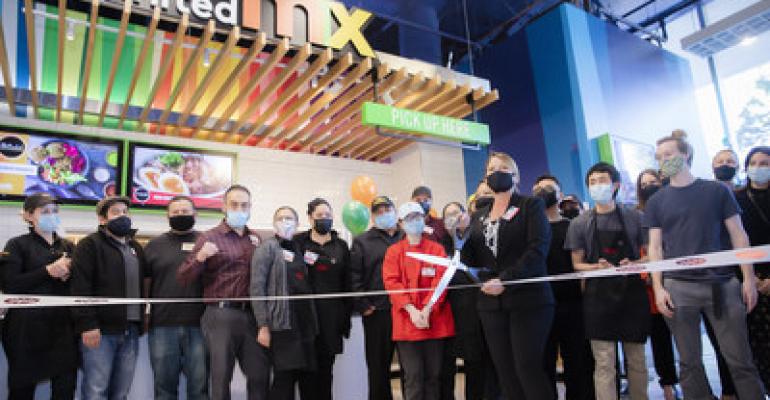Third-party delivery services are starting to expand their repertoire beyond local restaurants into groceries, liquor stores and pharmacy runs. Now, cannabis is added to that list as delivery company Waitr announces its intention to acquire cannabis dispensary compliance POS company, Cova in December.
Besides this notable acquisition possibility, the tech space continues to be dominated by rounds of funding for up-and-coming technology solutions companies like Serve Robotics and Flipdish and Kitchen United is opening a restaurant inside a Kroger-owned grocery store.
Tech Tracker rounds up what’s happening in the technology sector of the restaurant industry, including news from restaurants, vendors, digital platforms, and third-party delivery companies. Here’s a breakdown of what you need to know and why:
Waitr intends to acquire Cova
Third-party delivery company Waitr announced the intention to acquire cannabis dispensary compliance POS company, Cova, entering a nonbinding agreement in December.
“Cova’s software solution is currently utilized by approximately 2,000 dispensaries in Canada and the United States and will provide an opportunity to offer these retailers regulatory compliant payment solutions and, when and if provincial regulations in Canada and federal and state regulations in the United States evolve, potentially the ability to offer delivery services as well,” Waitr CEO Carl Grimstad said in a statement. “Additionally, we believe that we may be able to adapt the Cova POS solution for restaurants in order to offer our restaurant base an integrated solution for in-house and food delivery services.”
The proposed purchase price is $90 million, though no deal has officially been announced.
Kitchen United opens restaurant inside Kroger-owned grocery store
Kitchen United is partnering with Kroger-owned Ralphs to open a kitchen-center/delivery, takeout and pickup-only restaurant in Westwood, Calif. Near Los Angeles, the company announced on Jan. 7. The announcement of this first restaurant comes five months after Kroger and Kitchen United unveiled their partnership over the summer.
Customers will be able to place orders via the Kitchen United proprietary MIX platform online, via mobile or at an in-person ordering kiosk. Meals can be picked up in person or be delivered. Shoppers will be able to choose from Fresh Brothers, Bushi by Jinya, Sajj Mediterranean, Doghaus, among other food vendors.
"Our work together provides millions of Kroger customers access to their favorite restaurant cuisines in a convenient supermarket format, while providing Kitchen United and our restaurant partners a high-touch, interactive storefront,” Michael Montagano, CEO of Kitchen United said in a statement.
Additional locations will come to Texas later this month.
Serve Robotics announces next level of robot capabilities; secures $13 million of funding
The robots are getting smarter. Autonomous sidewalk delivery company, Serve Robotics, announced that its delivery bots have unlocked the next level of autonomy. At level four autonomy, Serve’s delivery robots can operate fully without human intervention and “rely on their own capabilities to ensure safe operation.”
Serve Robotics recently completed its first level four food delivery, and the company claims it will revolutionize the autonomous delivery industry.
“[This] further enhances public safety by significantly reducing the potential for human error. This milestone begins to unlock the full potential of robotic delivery," said Serve Robotics co-founder and CEO, Dr. Ali Kashani. "This technical and commercial milestone is an achievement for the entire AV industry, and accelerates our mission to make delivery more accessible and sustainable."
Last month, Serve Robotics also announced a $13 million round of expanded seed funding for the company, with investors including Uber, 7-Eleven’s 7-Ventures, and Wavemaker Labs. With the funding, Serve Robotics will scale its operations, expand its robotic fleet, and grow geographically, along with continue to develop new autonomous products.
Flipdish becomes latest tech unicorn after raising $100 million
Tech unicorns (companies that hit $1 billion or more valuation) have become a major topic of discussion lately. Digital platform company, Flipdish, became the latest unicorn after raising $100 million in January led by Tencent. The company is now valued at $1.25 billion, following major $48.5 million investment from Tiger Global Management last year.
Like many restaurant tech companies, Flipdish provides a toolbox of digital tech solutions, including QR code ordering and tableside payment, online ordering for pick-up and delivery, self-service kiosks, loyalty programs, and digital marketing capabilities. The global company (which operates in 25 countries, including the U.S. and Canada), also works with ghost kitchen companies.
“Digitization has been transforming the hospitality sector for years,” Conor McCarthy, cofounder and CEO of Flipdish said in a statement. “The ongoing pandemic has further accelerated the trend with hospitality businesses becoming increasingly dependent on digital experiences to attract and retain customers.”
Itsacheckmate partners with Grubhub
Technology companies keep working on streamlining services to avoid the confusion caused by multiple apps, devices and kiosks in the back of the house. Grubhub announced this month an extended partnership with online food delivery marketplace, Itsacheckmate.
Together, Itsacheckmate and Grubhub will eliminate a manual intermediate step to transfer Grubhub orders from tablet to POS. According to the announcement, Itsacheckmate automatically ingests digital orders and prints them out like in-house orders, eliminating the need for tablets for back of house employees, and further digitizes POS capabilities.
Square partners with Ally service platform
The software and payments solution company, Square (now known as Block, Inc) announced a partnership this month with Ally, a “Software as a service” platform that is designed to help restaurants navigate common digital delivery issues like third-party fees, order delays/errors and customer dissatisfaction. Ally also has a fleet of 90,000 drivers, which will integrate with Square’s existing capabilities like payment processing, payroll integration and loyalty programs, which Ally customers will now have access to.




